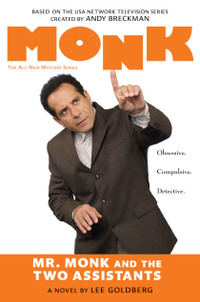It was bad enough when Amazon offered customers the opportunity to buy lower priced, used copies from second-hand booksellers on the same page as the new books they were selling. Now it’s even worse.
I was dismayed today to discover that Amazon is selling remainder copies of MR. MONK AND THE TWO ASSISTANTS on the same page as the full-priced hard-cover and the new paperback release, which comes out tomorrow.
I can’t say I’m too happy about this. Amazon is costing me money…but even so, I’m not sure that I’m ready to support an effort to legislate a cut for authors of second-hand sales.
Novelists Inc, a non-profit organization of multiply-published novelists, is advocating a rewrite of the copyright laws that would force second-hand booksellers to pay authors a percentage of the cover price for any book that’s resold within two years of its original publication.
NINC recommends that commercial used-book sellers be
required to pay to publishers a “Secondary Sale” fee
upon the reselling of any book within two years of its original publication
date. A percentage of these fees would then transfer to authors in accordance
with contractual agreements between authors and publishers, thereby reinforcing
the Founders’ intent, as stated in Article I of the Constitution, to
protect authors’ exclusive right to benefit from their work.
Ninc further recommends that the fee paid to publishers and
authors would be some fair percentage of the cover price of the individual
book. While
it has been argued in the past that such a fee would unduly burden used-book
sellers by increasing administrative tasks, that argument is rapidly becoming
moot. Today, the largest sellers of used books have a strong Internet presence,
allow Internet-based sales transactions, and maintain records of their sales
and inventories, at least in part, by using ISBN numbers, as do other booksellers.
The use of ISBN numbers to track sales is the same process whether it is being
used by a used-book seller or a seller of new releases, and makes the payment
of a fee a simple matter when calculated and transacted electronically.
I’m feeling the pain of lost royalties, but I’m not sure that the proposed legislation is a good idea. What’s next? Should we insist that people pay a percentage on any CDs, DVDs, sofas, and cars that are re-sold within two years of their original release?
I have heard it argued that asking for a percentage of subsequent sales is no different than, for example, artists getting royalties on the reruns of TV shows. As someone who straddles both fields — publishing and screenwriting — I see a big difference.
In the case of a TV show, I am writing the script for the studio, which then exploits that product in many different ways — licensing it to a network for broadcast, licensing it to a cable network for re-broadcast, selling it on DVDs, etc. In almost all of those scenarios, the studio retains ownership of the product. They are, in effect, lending it to someone else and sharing in the proceeds of this alternative exploitation of the product. As an artist, I share in whatever the studio gets, no matter how it is exploited.
But there’s a difference between exploitation and consumption. When the studio sells the show to a consumer as a DVD, I get a share of the sale price. The consumer owns the DVD itself (though not the copyrighted content that it contains). If the consumer decides to resell the DVD, the studio gets nothing from that sale and neither do I. The consumer paid for the DVD, he should have the right to resell that physical object if he pleases. That seems reasonable to me…even though I am losing money in all kinds of ways as a result. But I also believe in basic consumer rights and simple capitalism.
The DVD example is much closer to how things are with books.
In the case of a book, I write a novel for a publisher, which then exploits that product in many different ways — hard cover publication, paperback publication, e-book publication, foreign language publication, audio books, etc. In all those scenarios, the publisher retains control of the product (for a limited time as determined by my contract). I share in whatever proceeds they get. When a consumer buys a book, I get a share of the sale price. That’s end of the revenue stream for the publisher and for me, too. The consumer owns the book itself, though not the copyrighted content. As it stands now, and as it has for centuries, once you buy a book, that physical object is yours to do with as you please. You might not own the content, but you own the book itself.
I can certainly see the huge benefits for writers, and the publishing industry, in the proposed two-year/shared proceeds legislation…but as someone who loves to buy used books, I can also see how it could unfairly infringe on consumer rights, inhibit capitalism in its simplest form, and how it could set a dangerous precedent that could be extended to other products.
What do you think?



